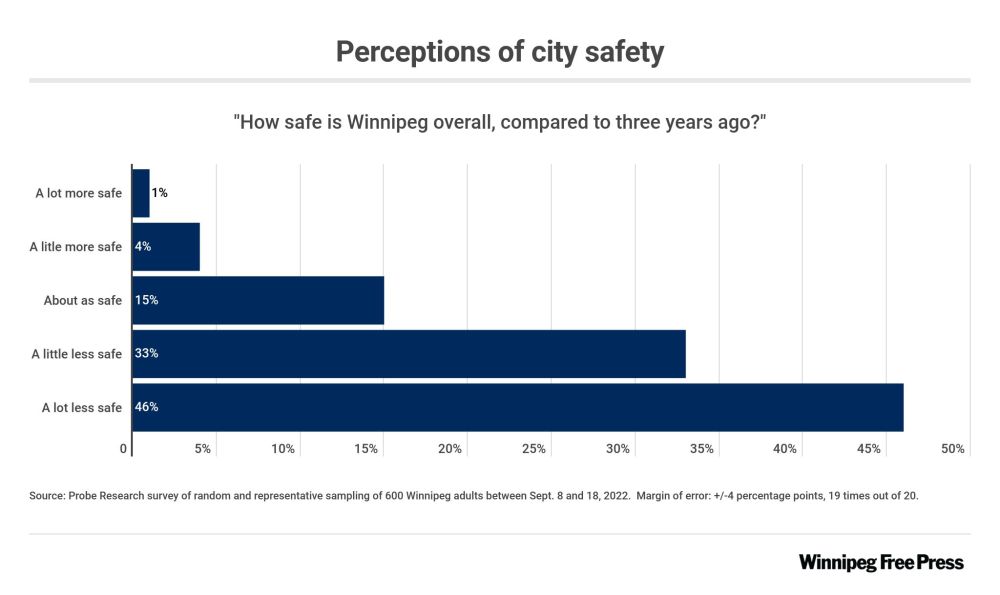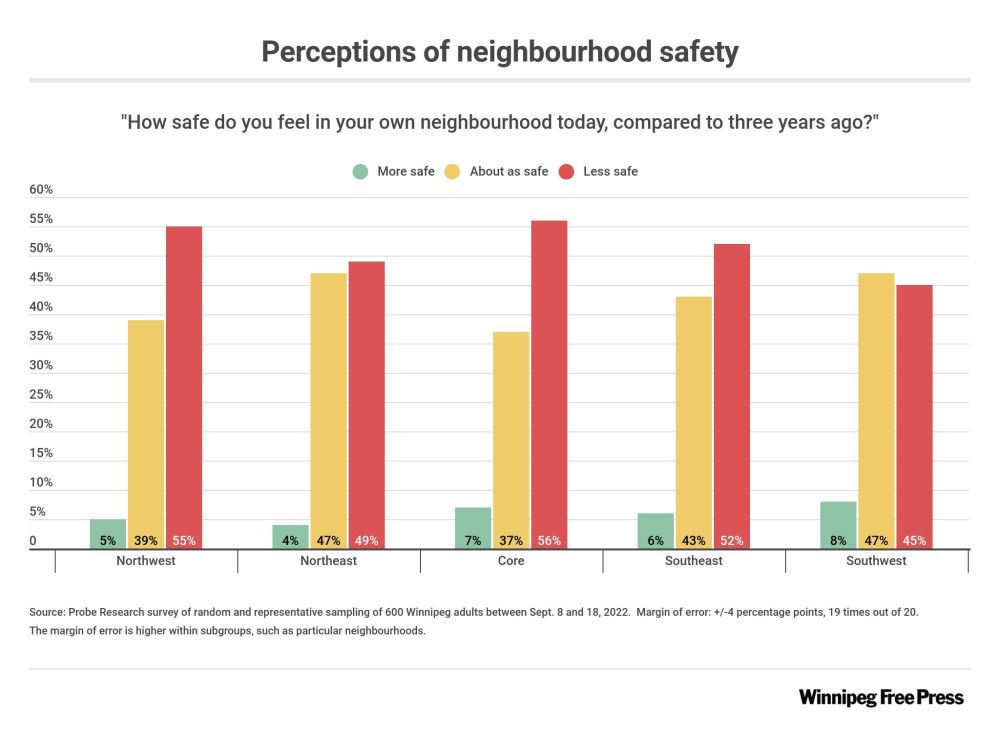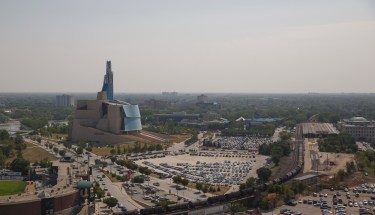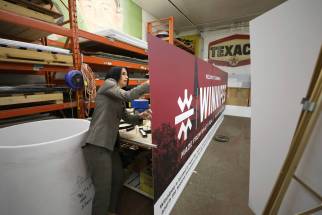Safety concerns in city at ‘crisis level,’ pollster says Nearly four out of five adults feel greater threat from crime than they did three years ago, survey reveals
Read this article for free:
or
Already have an account? Log in here »
To continue reading, please subscribe:
Monthly Digital Subscription
$0 for the first 4 weeks*
- Enjoy unlimited reading on winnipegfreepress.com
- Read the E-Edition, our digital replica newspaper
- Access News Break, our award-winning app
- Play interactive puzzles
*No charge for 4 weeks then price increases to the regular rate of $19.00 plus GST every four weeks. Offer available to new and qualified returning subscribers only. Cancel any time.
Monthly Digital Subscription
$4.75/week*
- Enjoy unlimited reading on winnipegfreepress.com
- Read the E-Edition, our digital replica newspaper
- Access News Break, our award-winning app
- Play interactive puzzles
*Billed as $19 plus GST every four weeks. Cancel any time.
To continue reading, please subscribe:
Add Free Press access to your Brandon Sun subscription for only an additional
$1 for the first 4 weeks*
*Your next subscription payment will increase by $1.00 and you will be charged $16.99 plus GST for four weeks. After four weeks, your payment will increase to $23.99 plus GST every four weeks.
Read unlimited articles for free today:
or
Already have an account? Log in here »
Hey there, time traveller!
This article was published 06/10/2022 (1157 days ago), so information in it may no longer be current.
With crime on many voters’ minds before the Oct. 26 municipal election, a new survey suggests an overwhelming majority of Winnipeg adults feel less safe in the city than they did three years ago.
In a Probe Research poll for the Free Press and CTV Winnipeg, 79 per cent of respondents said the city isn’t as safe as it was in 2019.
A total of 15 per cent said Winnipeg is about as safe as it was, while five per cent believe it is safer.
“When you have 46 per cent of Winnipeggers saying they feel a lot less safe, that is, I think, at a crisis level in terms of our perception of our own city,” said Probe Research principal Mary Agnes Welch.
“In the last few civic elections, crime hasn’t been that big of an issue. This year, it’s absolutely exploded to the top of people’s minds.”
As candidates pledge to reduce crime, advocates are encouraging city hall to try new ideas and commit more resources to social services to ensure residents’ basic needs are met.
“I believe crime reduction is poverty reduction,” said Ryan Beardy, co-ordinator of the Gang Action Interagency Network. “A lot of people’s first crimes are crimes of opportunity or crimes of poverty, for survival.”
Half of those polled feel less safe in their own neighbourhood, with the highest proportions in the core (56 per cent) and northwest (55 per cent).
Four in 10 feel about as safe. Six per cent feel more safe.
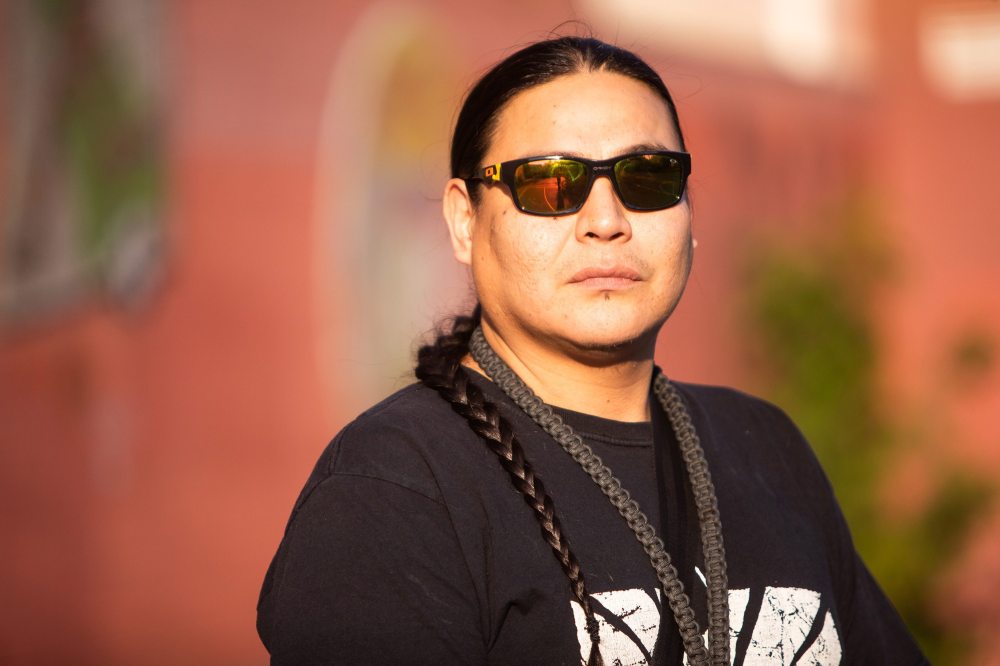
Those more likely to feel less safe are older adults, homeowners and people with an education level of high school or less, according to the online survey of 600 adults conducted Sept. 8-18.
Four in 10 reported being a victim of crime in the past three years. The vast majority are property or less-serious offences.
Inner-city, Indigenous and racialized residents are more likely to have been victims.
To tackle crime or its root causes, the city doesn’t have as much authority or money as the provincial and federal governments. It can, however, provide funding for social issues and partner with grassroots agencies and higher levels of government.
“The common denominator in most crimes is people aren’t having their basic needs met in life,” said Prof. Frank Cormier, a criminologist at the University of Manitoba. “There are some lower-level things that do add up that the city could try to get involved with.”
MIKE DEAL / WINNIPEG FREE PRESS FILES In a Probe Research poll for the Free Press and CTV Winnipeg, 79 per cent of respondents said the city isn’t as safe as it was in 2019.
Social-service officials who spoke to the Free Press said the city can play a larger role in supporting Winnipeggers who are vulnerable or lack a safety net.
“They have tools and they have levers. The issue is how they spend their money,” said Kate Kehler, executive director of the Social Planning Council of Winnipeg.
Almost half of the city’s $1.2 billion operating budget for 2022 is being spent on emergency services. Just under 10 per cent ($116 million) has been earmarked for community services.
The city is spending $7 million on crime-prevention measures, along with $1 million on supports such as mobile outreach for people without housing and public washrooms in the downtown area.
Beardy said the city must help strengthen front-line resources for youths and people in crisis.
“A well-supported youth isn’t going out there doing crime,” he said.
“The common denominator in most crimes is people aren’t having their basic needs met in life.”–Prof. Frank Cormier
Addressing issues such as poverty, addictions, mental health and homelessness will also help to ease demand on services such as health care and crisis support, said advocates.
In November 2021, city council approved a 10-year poverty-reduction strategy. Proposals include more affordable housing units and drinking fountains in parks.
The strategy must be properly funded to achieve its objectives, said Kehler, noting there is already a lack of funding for community grants.
The city estimates about 13 per cent of Winnipeggers live in poverty, rising to 28 per cent for Indigenous residents and 27 per cent for newcomers.
Elmwood resident Mark Hill has had five break-ins at his property in the 12 years he has lived there. The latest was Sept. 22.
He believes Winnipeg needs “fresh faces and fresh ideas” to combat crime and improve standards of living.
“The main factor of crime is poverty, so why, in one of the richest nations in the world, do we have any poverty at all?” said Hill. “Why have any social safety net if you’re not going to fund it properly, so people don’t have to resort to crime to make their rent or feed their kids?”
He supports giving police more resources, and measures such as an anti-loitering bylaw for crime-plagued areas.
Social-service agencies want the city to boost recreation and opportunities to create stronger community ties in deprived neighbourhoods.
Main Street Project executive director Jamil Mahmood said the downtown core lacks green space and community centres.
“People that live in this neighbourhood are residents. This is their home and this is their community, and they’re never treated like that,” he said.
MIKE DEAL / WINNIPEG FREE PRESS FILES Main Street Project executive director Jamil Mahmood said the downtown core lacks green space and community centres.
To establish relationships and trust between residents and police, there must be more opportunities for “positive engagement,” said Mahmood.
He would welcome funding to increase outreach services, and more efforts to crack down on bad landlords or buildings that are hubs for drug use.
Beardy is among the proponents of a supervised drug-consumption site. He said a site would provide pathways to supports, including treatment.
The province, which has jurisdiction over health and addictions treatment, is not on board, but Ottawa can help set up one without provincial approval.
People experiencing addiction, poverty, mental health or homelessness are “more often than not” victims of crime, said Kehler.
Jason Whitford, president and CEO of End Homelessness Winnipeg, said people without housing are at a much greater risk, adding the pandemic has exacerbated poverty and homelessness.
“We need to have a co-ordinated effort and a parallel investment to create different forms of housing that meet the complex needs of those on the street,” said Whitford.

Those housing initiatives should be Indigenous-led, he said, given 70 to 80 per cent of people on the streets are Indigenous.
Social supports must be culturally appropriate and include Indigenous involvement, said Whitford.
“To me, that’s reconciliation. The answers to some of these challenges are within our people,” he said. “Part of decolonization is empowering the Indigenous community, and allowing them to reclaim responsibility for our people.”
Indigenous people are vastly overrepresented in the justice system as victims and accused.
“Part of decolonization is empowering the Indigenous community, and allowing them to reclaim responsibility for our people.”–Jason Whitford
In July, a Statistics Canada study acknowledged the link between the victimization of Indigenous people and past and present government policies, including residential schools and institutionalized racism.
Those policies have disrupted community and family structures and caused intergenerational trauma, the agency wrote.
To increase its spending on social services, the city would have to look at raising or introducing new taxes, or cutting funding in other areas, advocates said, suggesting a significant reduction in the Winnipeg Police Service budget, which accounts for 26.8 per cent of the city’s 2022 operating costs.
The WPS was allocated almost $320 million, an annual increase of $7 million, with about 86 per cent going toward salaries and benefits.
Its total projected expenses by end of year are $327 million.
At a Sept. 16 meeting, Chief Danny Smyth told the Winnipeg Police Board he is planning to request more resources to cope with a jump in calls for service.
He declined a Free Press request for comment.
JESSICA LEE / WINNIPEG FREE PRESS FILES At a Sept. 16 meeting, Chief Danny Smyth told the Winnipeg Police Board he is planning to request more resources to cope with a jump in calls for service.
Winnipeg Police Cause Harm, a police-abolitionist group, wants candidates to commit to cutting, or defunding, the WPS budget by 10 per cent and spending the money on social services.
City Coun. Markus Chambers, the police board chair, claims a budget cut could lead to longer response times and officer burnout.
“The only way to accomplish that (defunding) is complement reduction,” said Chambers. “I imagine it would be more than 100 officers.”
Police resources are already being stretched thin by an increase in violent crime, population growth and expansion of the city, he said.
Hiring more officers will fail to bring a “turnaround” in the city’s public-safety issues, said Kehler.
“For a long time, we have invested too much money in the police budget,” she said. “If what we’re doing is not working, then why are we going to continue down that road?”
“For a long time, we have invested too much money in the police budget… If what we’re doing is not working, then why are we going to continue down that road?”–Kate Kehler
A recent police board survey suggests Winnipeggers’ trust and confidence in police has declined in recent years.
Probe’s polling of Winnipeggers in the last five to 10 years has shown a shift from “we need more police” to a greater desire to address the root causes of crime, Welch said.
Chambers is among those who want calls for services such as welfare checks, where appropriate, to be handled by trained professionals rather than officers to avoid escalating a situation, which would allow police to respond to other matters.
Winnipeg is piloting a project that sends a plainclothes officer and mental-health clinician to 911 reports of a mental-health situation, after uniform officers confirm it is safe.
Some advocates say police shouldn’t be involved in such a program.
chris.kitching@freepress.mb.ca
Twitter: @chriskitching
As a general assignment reporter, Chris covers a little bit of everything for the Free Press.
Our newsroom depends on a growing audience of readers to power our journalism. If you are not a paid reader, please consider becoming a subscriber.
Our newsroom depends on its audience of readers to power our journalism. Thank you for your support.
History
Updated on Thursday, October 6, 2022 5:38 PM CDT: Adds a different image of Ryan Beardy

